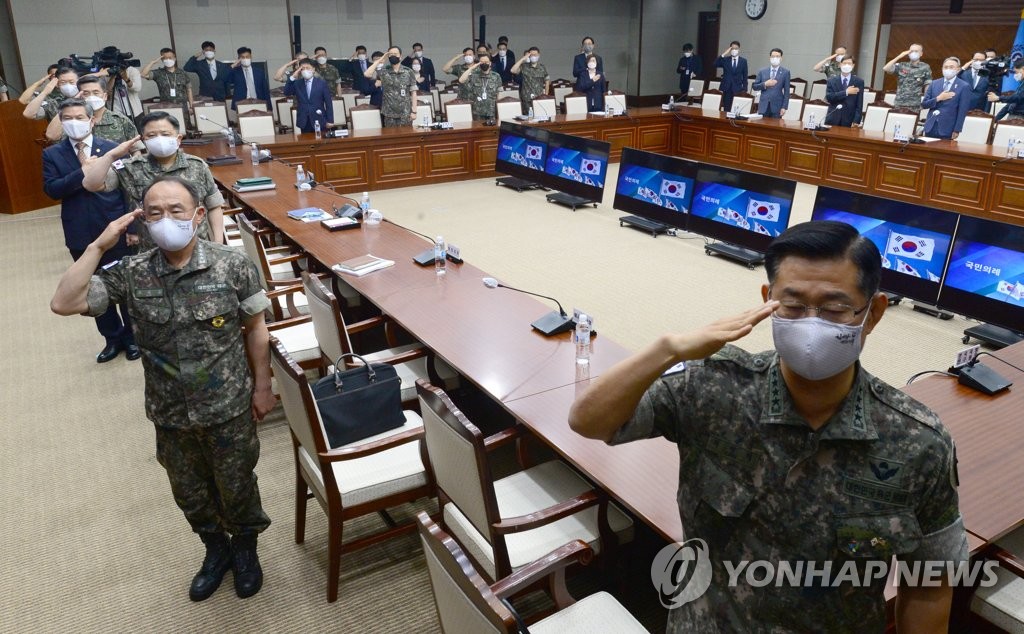- California Assembly OKs highest minimum wage in nation
- S. Korea unveils first graphic cigarette warnings
- US joins with South Korea, Japan in bid to deter North Korea
- LPGA golfer Chun In-gee finally back in action
- S. Korea won’t be top seed in final World Cup qualification round
- US men’s soccer misses 2nd straight Olympics
- US back on track in qualifying with 4-0 win over Guatemala
- High-intensity workout injuries spawn cottage industry
- CDC expands range of Zika mosquitoes into parts of Northeast
- Who knew? ‘The Walking Dead’ is helping families connect
S. Korea vows to fully implement inter-Korean military deal despite N.K. threats
South Korea will fully implement a military tension-reduction agreement with North Korea despite Pyongyang’s threat to scrap it, the defense ministry said Wednesday, amid heightened tensions over anti-Pyongyang leaflets.
During a meeting of top commanders presided over by Defense Minister Jeong Kyeong-doo, officers said the agreement signed in 2018 has “specifically and practically” contributed to reducing tensions between the two Koreas, according to the ministry
“Despite the recent difficulty in inter-Korean relations, our military decided to fully implement the Sept. 19 military agreement to continue efforts for realization of reduction in military tensions, and to militarily back the government’s policy for denuclearization of the Korean Peninsula and the peace process,” the ministry said in a release.
Kim Yo-jong, the powerful sister of North Korean leader Kim Jong-un, threatened last week to scrap the deal and to halt other cross-border projects in anger over Seoul’s failure to stop North Korean defectors from sending anti-Pyongyang leaflets across the border.
On Tuesday, the North cut all communication lines with South Korea, citing the activists’ leaflet campaign, and said it is working on “phased plans” to now deal with the South as an “enemy.”

Top commanders salute the national flag during a meeting presided over by Defense Minister Jeong Kyeong-doo in Seoul on June 10, 2020, in this pool photo. (Yonhap)
Referring to the North’s recent missile launches and warnings, Jeong said Pyongyang is blaming Seoul for strained inter-Korean relations when it is the one ratcheting up tensions on the peninsula.
“North Korea is criticizing our military’s routine exercises and defense buildup, shifting the blame for the strained inter-Korean relations to us … while heightening military tensions,” he said.
“Considering the current North Korea circumstances, I specially highlight a military readiness posture to perfectly respond to any unexpected situations,” the minister said.
South Korea and the United States are maintaining a robust combined defense posture, Jeong added, disclosing that they carried out joint air and missile defense exercises as scheduled in the first half of the year.
In April, the two sides also came up with a joint draft document stipulating what their combined defense system would look like after the envisioned transfer of the wartime operational control of South Korean forces from Washington to Seoul, according to Jeong.
The defense chief also ordered the military to more strictly control people’s access to areas near the border with North Korea.
Officials said the minister called for strengthened measures to stop unauthorized people from entering the civilian access control areas in order to curb the defectors’ activities.
For years, North Korean defectors in the South and conservative activists have flown the leaflets to the North via balloons to help encourage North Koreans to eventually rise up against the Pyongyang regime.
North Korea has bristled at the propaganda campaign amid concern that an influx of outside information could pose a threat to its leader Kim Jong-un.
North Korea has repeatedly called for an end to the leafleting campaign. The issue has long been a source of tension between the two Koreas, which are still technically at war because the 1950-53 Korean War ended in a truce, not a peace treaty.
In 2015, a Seoul court ruled that South Korean authorities can intervene and stop the leafleting campaign if there is a clear threat to the safety of South Koreans.
Also Wednesday, the unification ministry, which handles inter-Korean affairs, said it will file a complaint with police against two North Korean defector groups for sending anti-Pyongyang leaflets across the border.
South Korea promised to take legislative measures to prevent activists from sending leaflets, but the North derided Seoul’s envisioned move as belated and “little more advanced excuses.”












